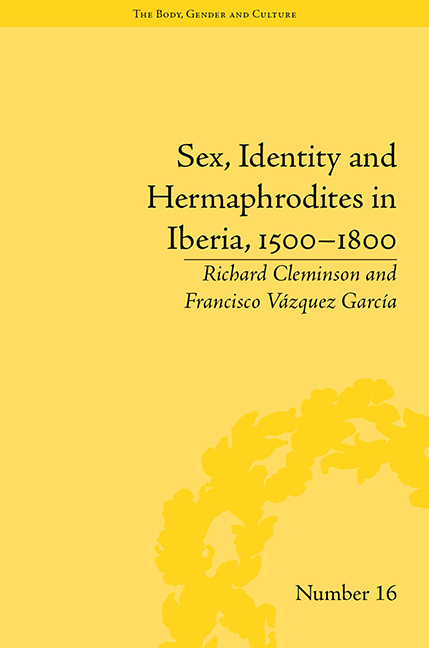Book contents
- Frontmatter
- CONTENTS
- Acknowledgements
- Introduction: Sex, Gender and Historicity
- 1 Marvels, Monsters and Prodigies: Hermaphrodites as Natural Phenomena in Spain, 1500–1700
- 2 Sexual Transgression and Hermaphroditism: The ‘New World’ and Imperial Subjectivity
- 3 The Expulsion of the Marvellous: The Decline of the ‘One-Sex’ Model, 1750–1830
- 4 Hermaphroditism in Portugal
- Conclusion
- Notes
- Works Cited
- Index
4 - Hermaphroditism in Portugal
- Frontmatter
- CONTENTS
- Acknowledgements
- Introduction: Sex, Gender and Historicity
- 1 Marvels, Monsters and Prodigies: Hermaphrodites as Natural Phenomena in Spain, 1500–1700
- 2 Sexual Transgression and Hermaphroditism: The ‘New World’ and Imperial Subjectivity
- 3 The Expulsion of the Marvellous: The Decline of the ‘One-Sex’ Model, 1750–1830
- 4 Hermaphroditism in Portugal
- Conclusion
- Notes
- Works Cited
- Index
Summary
This chapter locates a number of cases of suspected hermaphroditism in Portugal within the prevailing local framework of sixteenth- to early nineteenth-century interpretations on the question of sexual ambiguity. On doing so, it acknowledges that thought on this subject can be described as an example of transnational knowledge exchange between the kingdoms of Iberia existing at that time and, more broadly, between Spain, Portugal and other European countries, in particular France, Germany and Italy. The desire to pinpoint precisely which ideas came from specifically Portuguese theologians and doctors and which from their Spanish counterparts is a somewhat elusive task given these exchanges. What we seek here, therefore, is not a national history of thought on hermaphroditism. Indeed, the very fact that many commentators on hermaphroditism and sex change – such as Amatus Lusitanus (b. Castelo Branco, 1511–68), Rodrigo de Castro (b. Lisbon 1546), Zacuto Lusitano (b. Lisbon, 1575–1642) and Isaac Cardoso (b. Trancoso, Beira Alta, 1603/4–80) – were either born in Portugal, marranos descended from Spanish conversos, educated at universities such as Salamanca, or wrote their major contributions to medical thought in cities such as Antwerp or Verona blurs such easy distinctions and stories about any supposed national origin of scientific thought.
The opening section of this chapter focuses on some examples of sexual and ‘gender’ ambiguity (with the caveats on this terminology already highlighted in the Introduction) in Portugal from the 1500s onwards in order to provide a context for the cases of hermaphroditism that are presented later.
- Type
- Chapter
- Information
- Sex, Identity and Hermaphrodites in Iberia, 1500–1800 , pp. 85 - 110Publisher: Pickering & ChattoFirst published in: 2014



